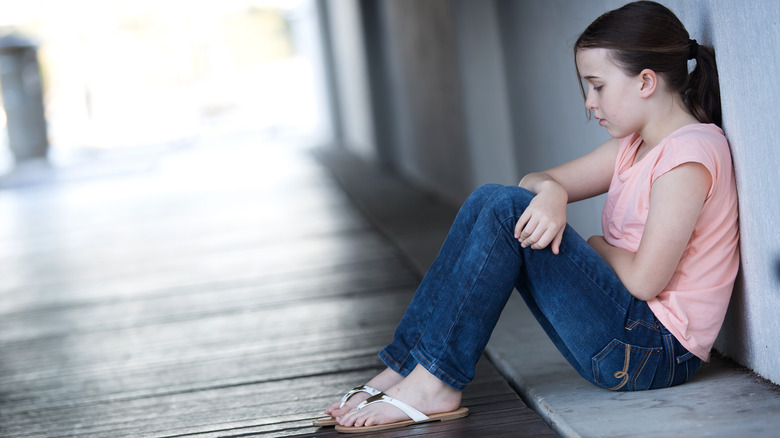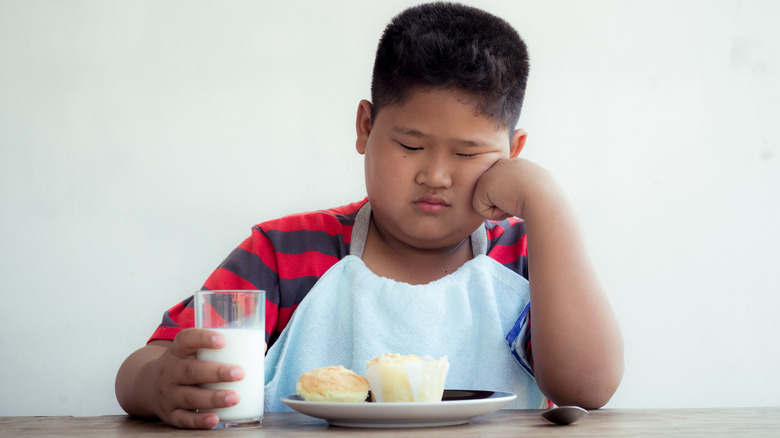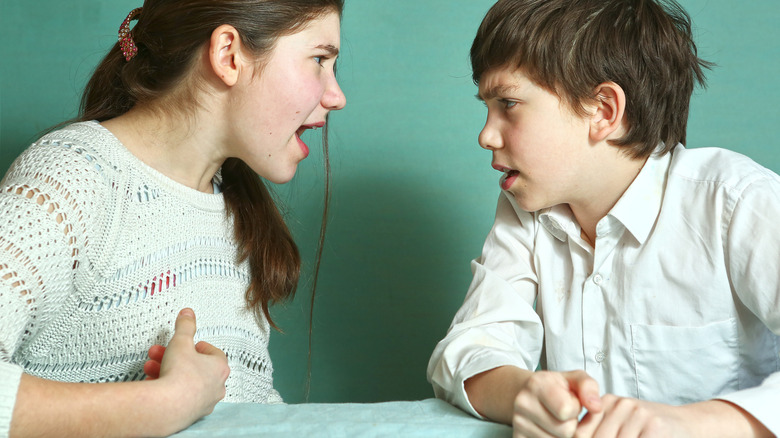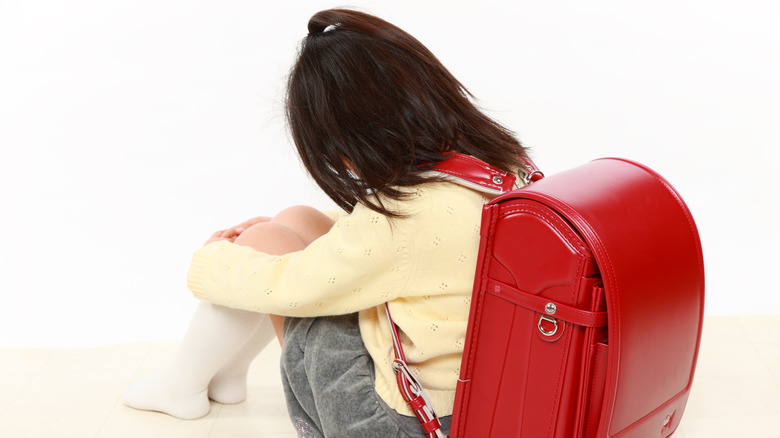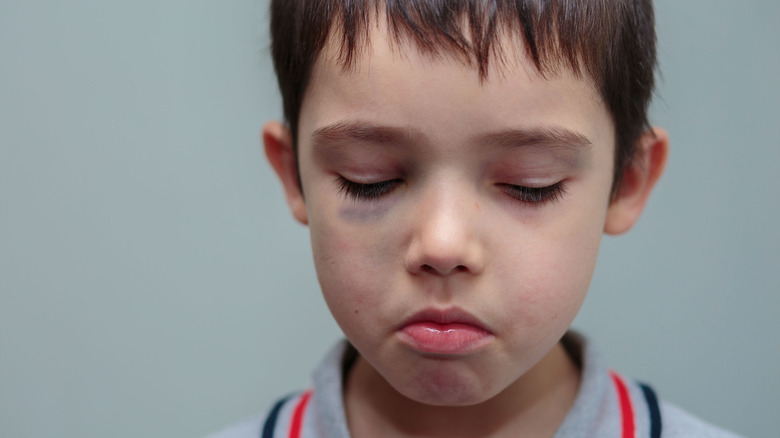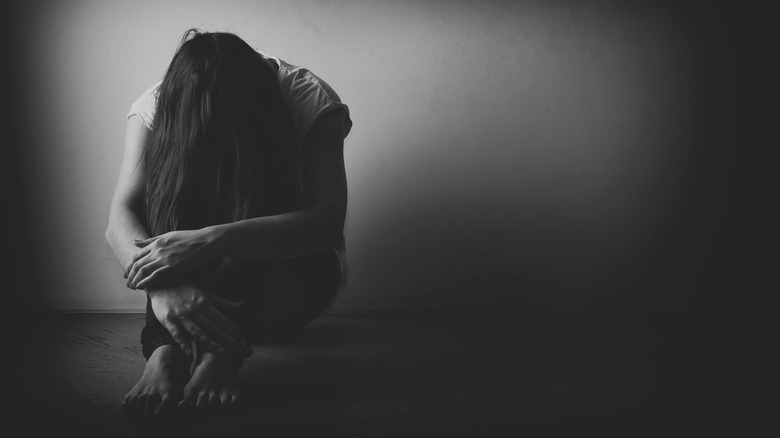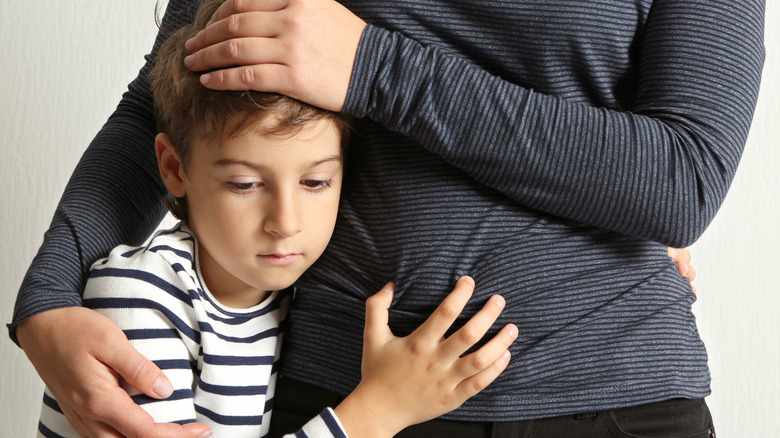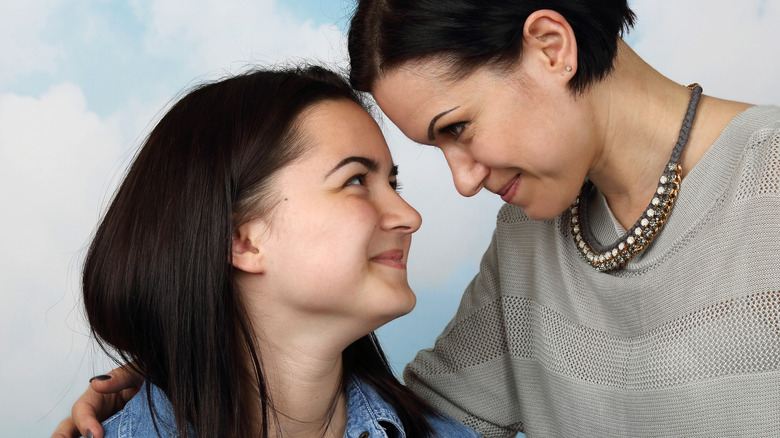Signs Your Kid Is Getting Bullied
When I was in middle school, I faked sick more than I'd like to admit. My mom knew I wasn't really sick, but she let me stay home anyway sometimes. She knew how much I hated school. I hated middle school because of the bullies. The boys who would meet me in the hall and mimic my hair with their hands, pretending to explode their heads. The kid who kicked my chair every day during math class.
I had friends. I had social skills. But that didn't stop those boys from bullying me. I look back at that time now and think, "No matter what happens in my life, at least I never have to go back to middle school." Luckily, I had supportive parents who loved me and listened to me. Even when school became unbearable, I was okay because my parents had my back. And I left middle school relatively unscathed.
If your child is being bullied, it's important to find out as soon as possible so you can get help. But how do you know if your child is a victim of bullying? What signs should you look for? And how do you support your child if they are being bullied?
Your child acts depressed
Many of the most common signs that your child is a victim of bullying are actually symptoms of depression. When your child is bullied and mistreated at school, it's natural for them to feel depressed.
In a 2001 study about bullying behaviors in U.S. youth published in JAMA, authors Tonja R. Nansel, Ph.D.; Mary Overpeck, Dr.PH.; and Ramani S. Pilla, Ph.D. wrote, "Youth who are bullied generally show higher levels of insecurity, anxiety, depression, loneliness, unhappiness, physical and mental symptoms, and low self-esteem."
According to the CDC, depression shows up in a number of ways, including changes in your child's sleeping habits and eating habits, disinterest in things your child once enjoyed, feelings of sadness and worthlessness, and lack of ability to pay attention.
Depression can lead to tragic things like suicide and cutting, so look for the less severe symptoms in order to catch it early.
Your child's eating habits change
If you notice that your child is no longer eating dinner, or, alternatively, coming home from school ravenous with hunger, they may be a victim of bullying. These changes occur for a number of reasons, including depression. Other possibilities include the chance that bullies are stealing your child's food or lunch money, or your child may be giving their food away to avoid being hurt.
Mayra Mendez, Ph.D., a licensed psychotherapist at Providence Saint John's Child and Family Development Center told me, "A child may demonstrate decreased appetite and eating behaviors such as refusing to eat at school, hiding food and hoarding it, or taking food to school and not eating him or herself, rather giving it away, or it is being taken away by peers."
If you make your child's favorite food for dinner and they refuse to eat, or if your kid, who previously had a healthy appetite, starts to lose weight, it may be cause for concern. Do what you can to be supportive and ask them if anything is going on at school.
Barron Whithead of Agora Cyber Charter School suggested, "If parents think their child is being bullied, it is highly recommended to a have an open, non-judgmental conversation with them. It is important to listen to what they are expressing to you. Pay attention to verbal and nonverbal communication. If they talk about what they are experiencing and feeling, it can provide support and help them to remain calm during these situations. It helps for students to discuss their concerns and fears with someone that can be encouraging [and] supportive as well as a good listener."
Your child has trouble sleeping
Is your child having more nightmares than usual? If you find yourself frequently waking up in the middle of the night to comfort your frightened child, or if they seem tired all the time, it may be the result of bullying.
Dr. Mendez described possible change in sleep patterns this way: "The child is demonstrating disrupted sleep, such as having trouble falling asleep, having frequent and frightening dreams, having nightmares two or more times weekly, awakening two or more times a night and presenting as fearful and highly anxious, struggling with waking up and refusal to go to school, remaining in bed and sleeping most of the day on days off from school."
Whithead agreed, saying, "One of the short term effects of bullying can be problems sleeping and getting the
necessary rest they need."
Lack of sleep can grow into other problems, including declining grades and other health issues, so if you notice your child is having trouble sleeping, pay attention and take action immediately.
Your child wants to be alone all the time
Does your child spend a lot of time in their room? Do they say no when their friends invite them over? Do they want to quit their after school activities to stay home and watch TV? If so, you may be looking at a case of bullying.
Dr. Mendez told me that a child may be a victim of bullying if "the child was previously social, engaged in outings with friends, participated in school clubs and functions and then suddenly withdraws from social engagement, seems isolated and uninterested in friends, no longer has play dates, no longer speaks to classmates, and does not talk on the phone with friends."
Unfortunately, children who isolate themselves are even more likely to be bullied in the future. In their 2001 study, Drs. Nansel, Overpeck, and Pilla found "those bullied demonstrated poorer social and emotional adjustment, reporting greater difficulty making friends, poorer relationships with classmates, and greater loneliness. Youth who are socially isolated and lack social skills may be more likely targets for being bullied."
You may become frustrated with your child when they withdraw from you and other family members, but this is a time when you must make extra efforts to connect with your child. In our interview, Whithead emphasized the importance of reaching out to your child when you think they might be a victim of bullying. "It is important to encourage your child to tell an adult if they are being bullied or cyberbullied. Parents can help their children through this difficult time by providing encouragement, helping them to build their self-esteem and confidence levels. It also can help if children surround themselves with peers that are supportive and positive people."
Your child acts aggressively toward your family
Your daughter, who has always been so sweet to her siblings, suddenly starts taunting and making fun of them. Or your son, who was previously such a good helper at home, refuses to do his chores and yells at you when you ask him to help.
With no way to vent their anger at school, victimized children will lash out at their families. Lynn R. Zakeri, LCSW, a clinical therapist, told me, "In addition to the common signs, there is also the opposite where the bullied child becomes the bully at home. He/she internalized the aggression and takes it out on their safest targets, the people who love him/her unconditionally: his/her family."
She went on to explain, "For example, a child taunted for his clothes might come home and taunt his/her sibling for their fashion choices. The 'fighting back' he or she felt too intimidated to do at school becomes too big to ignore at home where they are safe and loved unconditionally."
Bullying can also change a child's self image, which then impacts how they act at home. Zakeri continued, "If the child is bullied often, you have to consider if they are beginning to view the definitions that the bully gave them as truth. Their inner voice starts saying, 'I am a loser and nobody likes me and I will never have any friends,' and then this becomes their reality and they start to dislike themselves, and then a self-fulfilling prophecy of getting mom/dad to view them as 'bad' too."
If you're experiencing this, you may have the urge to chastise your child. It's very frustrating to deal with an aggressive kid. Instead, be supportive and let your child know that you still love them and are on their side.
Your child doesn't want to go to school
It's common for victims of bullying to avoid going to school so they don't have to encounter their tormentors. You may notice that your child "feels sick" but doesn't have any symptoms of illness. Or that they make up reasons to avoid going to school, when they used to enjoy it. That's because they feel safer at home where they don't have to deal with bullies.
Educational consultant James Dillon told Great Schools, "If a child is suffering peer abuse and bullying every day — and I don't think adults realize how painful that can be — the best way for that child to protect himself is to not go to school."
Krystal Rogers-Nelson, A Secure Life parenting and child safety expert, told me, "Bullying can affect a child's confidence, sense of self-worth, and jeopardize their sense of safety. Validate their feelings and let them know that it's understandable to feel the way they do, that everyone feels worried sometimes."
Then take action to stop the bullying. Rogers-Nelson suggested, "Work together with the school and advocates to resolve the situation and protect your child, but minimize changes in routines. Then role-play how to react if the bullying happens again."
When your child has a plan for how to deal with the bullying, they'll feel safer to go back to school.
Your child's grades go down
Unsurprisingly, poor grades are another sign that your kid is being bullied. In addition to missing school, they may be less inclined to participate in class. Also, it may be harder to pay attention to school when your child is concerned about their safety.
In a 2010 study at UCLA, researchers found that bullying had a measurable effect on students' academic achievement. Jaana Juvonen, lead author of the study, said, "We cannot address low achievement in school while ignoring bullying, because the two are frequently linked. Students who are repeatedly bullied receive poorer grades and participate less in class discussions. Some students may get mislabeled as low achievers because they do not want to speak up in class for fear of getting bullied. Teachers can misinterpret their silence, thinking that these students are not motivated to learn."
If your child's grades begin to drop, look deeper to see what is going on. It may just be a lack of interest in school or laziness, but bullying could be the culprit, as well.
You see unexplained injuries on your child
When bullying becomes physical, you may be able to see the signs on your child's body. You might notice a new bruise on their leg or a scrape on their face.
These injuries could be from the bullies, or they could be self-inflicted. Dr. Mendez told me about these physical effects of bullying: "The child comes home from school with bruises, cuts, or scratches, and he or she is unable to explain how the injuries occur; the child is cutting him/herself (arms and/or legs) and tries to hide the cuts from parents."
Jennifer Freed agreed, adding, "Children who are victims of bullying withdraw emotionally and may not want to go to school or they may come home with bruises or get into more fights."
If you notice your child coming home with injuries, you may feel fear or sadness. But it's important to remain calm and take steps to help your child and stop the bullying.
Freed continued, "Listen and learn from your child without interrupting and talk to adults who are supposed to be supervising. Then come up with a plan to help all the kids, including the bully."
Your child says negative things about themselves
In middle school, I had horrible self-esteem. I thought I was too fat, hated my hair, and cringed when I looked in the mirror. It took years for me to recover from the taunting of my classmates.
Your child may be a victim of bullying if they say things like "I'm fat" or "No one likes me" or "I'm dumb."
Unfortunately, low self-esteem can last far beyond the acts of bullying. Zakeri told me, "When a child feels shamed or traumatized, it can be lifelong issues. Sometimes the child defines him/herself the way the bully defined him/her, and it takes a lot of work to re-define yourself."
Luckily, my parents loved me, big hair and all. They made sure to remind me of that all the time. If your child's self-esteem begins to plummet, it's especially important to show them how much you love and support them.
I interviewed Elizabeth Vachon, LICSW, and creator of Can't Bully in Schools, an anti-bullying program for middle schools. She suggested, "Praise your child for discussing the bullying and reinforce the positive qualities and attributes of your child as their self-esteem has definitely been affected by the bullying."
Your child cuts or thinks about suicide
If the bullying continues long enough, your child may begin to do self-destructive things such as running away from home, harming themselves, or talking about suicide.
Dr. Mendez told me, "Bullying experiences may contribute to thoughts of suicide and self-injurious behaviors such as cutting and eating disorders." She continued, "The child may look up information on self-injury or seem unusually curious in reading about suicide or seeing suicide themed YouTube videos."
It can be extremely difficult to understand why your child would want to hurt themselves. Mendez told me, "It is important to understand that self-injury begins as a response to perceived failures, disappointments, and emotional distress. Self-injury serves as an escape from emotional turmoil and distress." She added, "Bullying experiences commonly result in high levels of distress that is often not talked about or shared. Self-injury serves as a way to dampen the pain of the emotional distress caused by the bullying experience. The pain of self-injury is often not felt as much as the emotional pain that overwhelms the child."
If you notice signs that your child is hurting themselves, get help immediately, both to lessen their anxiety and to stop the bullying. "Some of the long-term effects of bullying can be anxiety, depression, and thoughts of suicide. It is important for parents to get their child the necessary help through counseling, being around supportive peers, and helping them to increase their confidence levels," Whithead suggested.
Make a plan to get your child help
If you discover that your child is a victim of bullying, don't despair. There are many steps you can take to help your child and stop the bullying.
First, have an open and honest conversation with your child. "The number one thing to tell your child who is being bullied is the words and actions of the bully are due to their problems and the words or bullying comments have no reflection or truth about your child," Vachon said.
Then, reach out to the school and talk to school officials and counselors who can help stop the bullying. Dr. Mendez offered this comprehensive plan: "Contact school officials to communicate details about the bullying and your concerns for your child's safety. Work to develop an action plan to prevent further bullying. The plan should include measures for increased supervision and monitoring."
She suggested you continue advocating for your child and said to "gather information about school anti-bullying policies. Notify law enforcement and consider filing charges if bullying does not stop. Monitor your child's behavior closely, and if your child presents with increasing emotional distress, seek counseling/mental health support for treatment of depression, anxiety, low self-esteem, and self-injurious symptoms."
Freed added, "The only way to stop bullying is to have all parties understand that bullying comes from unprocessed pain and that no one ever should be bullied or bully another. All youth need help to end the cycle."
Heal the effects of bullying
In the years after middle school, I healed from my encounters with my bullies. I made friends who loved and supported me, I found my crowd, and I continued to feel the support of my parents.
The painful effects of bullying can be healed. The important thing is to take action early, let your child know you support and love them unconditionally, and make sure the bullying stops as soon as possible.

